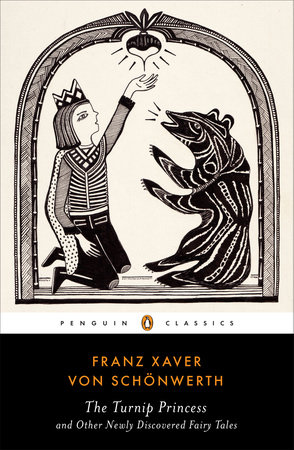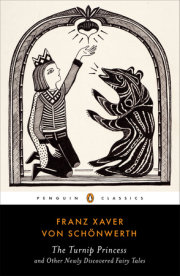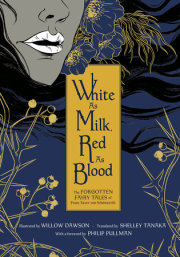"Prince Dung Beetle"
There was once a poor girl named Barbara, whose mother was ill. she had to run over to the doctor and druggist for help. On the way, she jumped across a paving stone and slipped, almost flattening a dung beetle. When she realized that she had sprained her ankle, she felt terrible and cried out: “Now who is going to bring back the doctor? My mother is going to die!”
The beetle muttered: “Climb up on my back.” Startled by the strange voice, the girl began to sob uncontrollably. The beetle slid right under her, spread its wings, and lifted her up in the air, carrying her to the doctor and druggist in a flash and then back home to her mother.
“You must be sure to feed your little horse,” the mother said to her daughter while they were eating bread and sipping water.
“Yes, of course, but my little horse seems to have wandered away,” Barbara said. She searched every corner of the house and looked out all the windows. Suddenly one of the king’s horsemen appeared on the horizon, riding toward them.
“Oh, that must be the Blue Prince,” the mother called out, as if he were an old friend. The door flew open, and the prince marched right in, looking radiantly young and handsome. He greeted the mother warmly, and then he looked at the young woman, took her by the hand, and said: “You lifted the curse on me, and I want to thank you by giving you everything i own.” Barbara did not know what todo, and she looked first at the prince, then at her mother. she was afraid of the stranger. But he explained what had happened to him: “For many years, more years than there are trees in the woods, I have been living as a beetle, crawling around in dust and refuse, beaten down, crushed, tortured, and in pain, all because I did the same things to animals when I was a boy. My punishment was to turn into a beast and to suffer as they do. You took pity on me, miserable beetle that I was, and that’s how you lifted the curse. I want to ask your mother for the hand of the angel who saved me!”
The girl turned pale, and both mother and daughter were deeply moved.
The prince threw open the shutters and blew on his horn. The mountains wafted the melody over the forests, and everything there awakened and came alive. Barbara and her mother began to realize that the many people who had suddenly appeared with horses and carts were the prince’s subjects, and they, too, had been rescued by the love of a simple young woman. The mother was soon healed, and her beautiful, rosy-cheeked daughter joyfully accepted the prince’s proposal.
At the wedding, the fleas played the fiddle, the birds whistled tunes, and all creatures with feet, large and small, danced and leaped through the air.
Copyright © 2015 by Maria Tatar. All rights reserved. No part of this excerpt may be reproduced or reprinted without permission in writing from the publisher.









